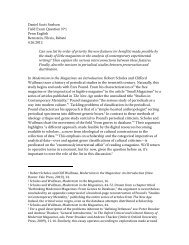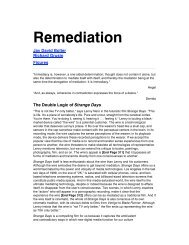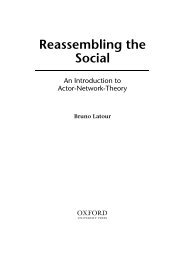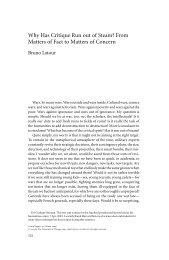The Exploit: A Theory of Networks - asounder
The Exploit: A Theory of Networks - asounder
The Exploit: A Theory of Networks - asounder
You also want an ePaper? Increase the reach of your titles
YUMPU automatically turns print PDFs into web optimized ePapers that Google loves.
174 Notes<br />
50. This results in the historical development <strong>of</strong> a “political science” or a<br />
political economy, through which the coordination <strong>of</strong> resources, peoples,<br />
and technologies can be achieved. As Foucault states: “<strong>The</strong> constitution <strong>of</strong><br />
political economy depended upon the emergence from among all the various<br />
elements <strong>of</strong> wealth <strong>of</strong> a new subject: population. <strong>The</strong> new science called<br />
political economy arises out <strong>of</strong> the perception <strong>of</strong> new networks <strong>of</strong> continuous<br />
and multiple relations between population, territory and wealth; and this is<br />
accompanied by the formation <strong>of</strong> a type <strong>of</strong> intervention characteristic <strong>of</strong><br />
government, namely intervention in the field <strong>of</strong> economy and population. In<br />
other words, the transition which takes place in the eighteenth century from<br />
an art <strong>of</strong> government to a political science, from a regime dominated by<br />
structures <strong>of</strong> sovereignty to one ruled by techniques <strong>of</strong> government, turns on<br />
the theme <strong>of</strong> population and hence also on the birth <strong>of</strong> political economy.”<br />
Foucault, “Governmentality” in <strong>The</strong> Foucault Effect: Studies in Govermentality,<br />
ed. Graham Burchell et al. (Chicago: University <strong>of</strong> Chicago Press, 1993),<br />
100– 101.<br />
51. This multistep process is simply a heuristic. To be precise, these steps<br />
do not happen consecutively. <strong>The</strong>y take place in varying orders at varying<br />
times, or sometimes all at once. For example, certain foundational protocols<br />
must always precede the genesis <strong>of</strong> a network (making our step three come<br />
before step two). <strong>The</strong>n after the network is in place, new protocols will emerge.<br />
52. Deleuze, Negotiations, 182. <strong>The</strong> difficulty with relying on Deleuze,<br />
however, is that he came to the topic <strong>of</strong> resisting informatic control rather<br />
late in his work (as did Foucault). His work on the topic <strong>of</strong>ten includes question<br />
marks and hesitations, as if he were still formulating his opinion.<br />
53. Hardt and Negri, Empire, 210.<br />
54. Gilles Deleuze, Foucault (Minneapolis: University <strong>of</strong> Minnesota<br />
Press, 1988), 92.<br />
55. Ibid.<br />
56. Ibid., translation modified. <strong>The</strong> quoted phrases refer to Foucault’s<br />
History <strong>of</strong> Sexuality.<br />
57. In addition, the recurring tropes <strong>of</strong> AI and “intelligence” (both artificial<br />
intelligence and governmental/ military intelligence) are made to bolster<br />
the dream <strong>of</strong> a transcendent mind that is not the brain, and a brain that is<br />
not the body.<br />
58. D. N. Rodowick, “Memory <strong>of</strong> Resistance,” in A Deleuzian Century?<br />
ed. Ian Buchanan (Durham: Duke University Press, 1999), 44– 45.<br />
59. Political movements oriented around changing existing technologies<br />
certainly do exist. We wish not to diminish the importance <strong>of</strong> such struggles<br />
but simply to point out that they are not protocological struggles (even if<br />
they are struggles over protocological technologies) and therefore inappropriate<br />
to address in the current discussion.<br />
60. Deleuze, Negotiations, 175.









